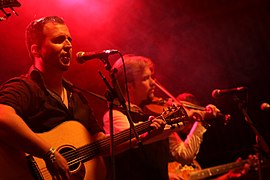January wine
| January wine | |
|---|---|
 January wine at an appearance at the 9th Nocturnal Culture Night in 2014 |
|
| General information | |
| Genre (s) | Neofolk |
| founding | 2007 |
| Website | http://www.jaennerwein.at |
| Founding members | |
| Max KTG | |
| Current occupation | |
Vocals, guitar |
Vurgart (since 2011) |
Singing, percussion, accordion
|
Beat Lenk (since 2009) |
Vocals, electric bass
|
Benjamin Sperling |
| Peter Feldl | |
Jännerwein is an Austrian neo-folk band founded in 2007 . She belongs to the younger Austrian generation of this musical trend.
history
Jännerwein was created in 2007 in Salzburg when Benjamin Sperling and Peter Feldl joined the Neuland ambient project by founder Maximilian Kurz Thurn Goldenstein alias Max KTG. A few months after the project began, the band released their first album, Abendläuten . The first public appearance took place in the Salzburg Cave Club on April 11, 2008.
The group experienced a huge increase in popularity through the invitation to the 18th Wave-Gotik-Treffen 2009. For the performance there, the line-up was strengthened by the drummer Beat Lenk and the violinist of the alpine folklore band Sturmpercht . Lenk became the fourth member of Jännerwein in a row. When he joined, work on the second album After Sehnsucht , to which the group dedicated the next two years, began to intensify . Appearances in the entire German-speaking area followed.
In autumn 2011, the solo artist Vurgart joined the band. After an appearance as the opening act for the pioneering band Death in June in Dresden in December 2011, the group again took part in the Wave-Gotik-Treffen in 2012.
On May 12, 2016, Jännerwein announced a concert break on their Facebook page. In September of the same year, founder Max KTG stated in an interview with the Austrian newspaper Die Presse that the concept had "actually been exhausted after three albums."
style
Jännerwein is characterized by a distinctive Truefolk style within Neofolk, which for the most part manages without the use of drums and audio samples that are typical of the genre. That is why they are considered a particularly successful live band within the Neofolk scene. This orientation could already be heard in the rudiments of the first album Abendläuten and became finally evident with the follow-up album Nach der Sehnsucht - From the permanence of memories .
The texts come partly from the pen of Max KTG and Benjamin Sperling, partly from German Romanticism .
In terms of instruments, the rhythm and melody guitar section, supported by bass, is often juxtaposed with traditional Central European instruments such as the hurdy-gurdy , violin or bagpipe . The songs are often written jointly by Max KTG and Peter Feldl and are often in a traditional Alpine style combined with modern singer-songwriter technology.
Reception in the New Right
January wines have been received in the new right scene especially in the recent past. In addition to a laudatory review of the debut album by the new right-wing magazine Blaue Narzisse , the band has been well received since 2015, especially within the growing identity movement . Videos of the group were repeatedly shared. In May 2016, the homepage of the online magazine Identitäre Generation published an exuberant review of the third album Eine Hope , and the Identitarian Movement began to play the group's songs at demonstrations. Finally, in an article in Rolling Stone magazine from August 2016, the leader of the Austrian identities, Martin Sellner , said January wine was a “right-wing alternative” and “easy-listening neofolk for entry” into the music scene of the New Right. After these statements, Jännerwein turned to Rolling Stone in an open letter and distanced himself from the Identitarian Movement and generally from the political use of their music:
What we particularly oppose, however, is the portrayal of Jännerwein as a “showcase band of the new right identities”. Of course, no band can choose their fans; But what we can do is to vehemently contradict the politically motivated use of our music. As little as we are flattered by Mr. Sellner's and the Identitarians' taste in music, we resolutely forbid ourselves to be pulled to the cart for politics of this kind, indeed for politics in general. [...] Our work is not an entry drug into any extreme political scene, whether "right-wing" or something else, and it mustn't be either. Where it should appear as such, it is always abusive, and by no means with our Sanctus.
Discography
- 2008: Abendläuten (Steinklang Records)
- 2011: After Longing - On the Persistence of Memory (RainbergVerlag)
- 2015: One Hope (Steinklang Records & RainbergVerlag)
Web links
- January wine at Discogs (English)
- January wine homepage
Individual evidence
- ↑ The sound of tribal longing? In: DiePresse.com. September 1, 2016, accessed September 2, 2016 .
- ↑ Dirk Hack: Alpine neo-folk between tradition and modernity: January wine - "evening bell". (No longer available online.) Archived from the original on August 29, 2016 ; accessed on August 29, 2016 .
- ↑ Jännerwein - One Hope (CD) - Identitarian Generation. (No longer available online.) In: www.identitaere-generation.info. Archived from the original on August 28, 2016 ; accessed on August 29, 2016 .
- ↑ Songs of Inhumanity. Retrieved August 29, 2016 .
- ↑ January wine on the new right. Retrieved August 28, 2016 .